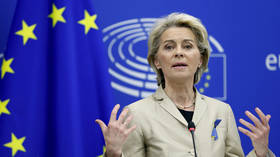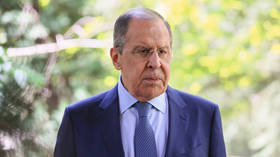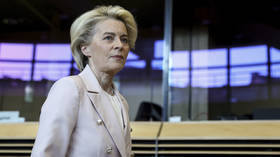Ursula von der Leyen accused of warmongering

The rhetoric of European Commission President Ursula von der Leyen about the conflict in Ukraine is “irresponsible” as she does not take into consideration that “Russia will not disappear from the world map after this war,” Stephane Buffetaut, a French politician and former head of the EU/Russia Liaison Committee in the European Parliament said.
Last week, von der Leyen described Russia as “the most direct threat to the world order,” saying its close relationship with China and both countries’ opposition to the US and its allies was “worrying.”
In a column for the Boulevard Voltaire news site, Buffetaut, who now serves as the national secretary for European affairs at the National Center for Independents and Farmers, claimed that “nothing can justify war against Ukraine” and that Russian President Vladimir Putin, by starting his military campaign against a “brotherly people,” sealed “his own weakening.”
However, the French politician argued, von der Leyen’s “martial” statements against Moscow “in no way promote a return to peace” as Russia will continue existing after the conflict.
“Moreover, its eventual break-up would be a disaster for the world and especially for Europe, a hotbed of instability in Eurasia and an opportunity for China,” Buffetaut said.
In his opinion, the head of the European Commission lives in a “virtual world” given that the EU is not taking part in the fighting, “has neither an army nor real diplomacy,” and has neither the capability nor intention of entering a direct confrontation with Russia, which would be “suicidal” anyway.
Buffetaut explained that all of the measures being taken by the EU, whether it be financial support for Ukraine or sanctions on Russia, are intended “to hinder Russia and help Ukraine, but it is not about combat.”
“This discrepancy between rhetoric and reality is dangerous. Support for Ukraine would no doubt be more effective without warmongering logorrhea,” the former MEP wrote.
In his column, Buffetaut cited some examples from the past that illustrate what he describes as “unfathomably clumsy” European policy towards Russia. He blamed the EU for conforming to the American vision of the world which, from his point of view, required avoiding a rapprochement between Western Europe and Russia.
“Americans have always been the adversaries of empires other than their own,” he claimed, adding that the United States has long been destabilizing the world through its Middle East policy. Over the last years, tensions have also become more obvious within Europe, including with regard to the sanctions against Russia, Buffetaut said.
“Mrs. von der Leyen should be concerned about this instead of playing a commander of an army that does not exist. It would also make sense to remember that the United States, a determined imperial nation, defends its own interests above all,” he concluded.
On Tuesday, the Kremlin spokesman Dmitry Peskov described the Western policy towards Russia as “war.”
In Peskov’s opinion, this policy is arranged “in the form of a pyramid, at the top of which is America.”
“Sometimes it seems that the very existence of our Russia is an irritant for the collective West, and they are ready to do anything to prevent us from developing the way we want and living the way we want,” Peskov said, reiterating that Russia cannot be isolated “by any means.”
Russia attacked the neighboring state in late February, following Ukraine’s failure to implement the terms of the Minsk agreements, first signed in 2014, and Moscow’s eventual recognition of the Donbass republics of Donetsk and Lugansk. The German- and French-brokered protocols were designed to give the breakaway regions special status within the Ukrainian state.
The Kremlin has since demanded that Ukraine officially declare itself a neutral country that will never join the US-led NATO military bloc. Kiev insists the Russian offensive was completely unprovoked and has denied claims it was planning to retake the two republics by force.














